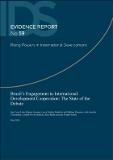| dc.contributor.author | Costa Leite, I | |
| dc.contributor.author | Suyama, B | |
| dc.contributor.author | Trajber Waisbich, L | |
| dc.contributor.author | Pomeroy, M | |
| dc.contributor.author | Constantine, J | |
| dc.contributor.author | Navas-Alemán, L | |
| dc.contributor.author | Shankland, Alex | |
| dc.contributor.author | Younis, M | |
| dc.coverage.spatial | Brazil | en_GB |
| dc.date.accessioned | 2014-05-19T15:23:06Z | |
| dc.date.available | 2014-05-19T15:23:06Z | |
| dc.date.issued | 2014-05 | |
| dc.identifier.citation | Costa Leite, I.; Suyama, B.; Tajber Waisbich, L. and Pomeroy, M. with Constantine, J.; Navas-Alemán, L.; Shankland, A. and Younis, M. (2014) Brazil's Engagement in International Development Cooperation: The State of the Debate, IDS Evidence Report 59, Brighton: IDS | en_GB |
| dc.identifier.uri | https://opendocs.ids.ac.uk/opendocs/handle/20.500.12413/3894 | |
| dc.description.abstract | The international development cooperation architecture has changed dramatically over the last decade. The global context, characterised by a lingering financial crisis and the emergence of new powers, has brought South–South Development Cooperation (SSDC) to the core of international development debate. The growing influence of emerging countries, such as the BRICS (Brazil, Russia, India, China and South Africa), as development cooperation providers requires a deeper understanding of how and to what extent these countries are promoting sustainable and inclusive development by cooperating with partners in the global South. To be able to answer these questions, the national dynamics need to be unpacked by mapping institutions, ideas, and interests informing decision-making processes, and shaping, not only policy priorities, but also the effectiveness of development cooperation.
Brazil is in the spotlight and Brazilian cooperation, in all its different modalities (from technical, scientific and technological, educational, and humanitarian cooperation to contributions to international organisations, refugee support and protection, and peace operations), has risen to unprecedented levels in recent years. According to official data, Brazilian development cooperation increased from US$160 million in 2005 to more than US$900 million in 2010. In that period, the country’s technical cooperation disbursements grew almost fourfold and its humanitarian cooperation expanded from less than half a million dollars in 2005 to US$161 million in 2010. However, interviews and the current budget freeze on the Brazilian Cooperation Agency’s (ABC) activities indicate that the upward trend may have changed in the last three years. | en_GB |
| dc.description.sponsorship | UK Department for International Development | en_GB |
| dc.language.iso | en | en_GB |
| dc.publisher | IDS | en_GB |
| dc.relation.ispartofseries | IDS Evidence Report;59 | |
| dc.rights.uri | http://creativecommons.org/licenses/by/3.0/ | en_GB |
| dc.subject | Development Policy | en_GB |
| dc.title | Brazil's Engagement in International Development Cooperation: The State of the Debate | en_GB |
| dc.type | IDS Evidence Report | en_GB |
| dc.rights.holder | IDS | en_GB |
| dc.identifier.ag | OT/11009/5/1/2/140 | |


